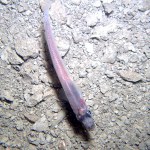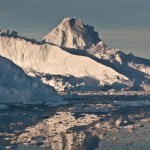A fish found swimming under 740 meters of ice. Credit: Reed Scherer (NIU)
An unexpected find and very exciting moment for researchers exploring what lies beneath 740 meters of ice in Antarctica...fish! An amazing find given the perpetual darkness and cold.
In an expedition sponsored by the National Science Foundation, scientists and ice drillers bored a hole through the Ross Ice Shelf near the coast of Antarctica, 850 kilometers from the closest place where there is sunlight. The area is known as the grounding zone, which is in essence a subglacial beach. According to a quote from glacial…
Antarctic
From NASA:
PASADENA, Calif. - An international team of experts supported by NASA and the European Space Agency (ESA) has combined data from multiple satellites and aircraft to produce the most comprehensive and accurate assessment to date of ice sheet losses in Greenland and Antarctica and their contributions to sea level rise.
In a landmark study published Thursday in the journal Science, 47 researchers from 26 laboratories report the combined rate of melting for the ice sheets covering Greenland and Antarctica has increased during the last 20 years. Together, these ice sheets are losing…
One of the most commonly winged-about facts of Earth's climate change we hear from science denialists is that sea ice in the Antarctic is increasing, therefore, there is no global warming. The fact that every other measurement of temperature and ice-osity indicates warming and melting would make a normal person think of the Antarctic situation as odd, and seek explanations, but somehow this logic does not emerge in the minds of the denialists. It has been suspected, and increasingly confirmed, for some time that the increase in sea ice in the Antarctic is the result of changes in wind…
One of the shocking revelations of the Swifthacking of CRU one year ago (aka Climategate) was the fact that scientists can be downright nasty. Contrary to all previous indications, scientists are not always shy, reserved and polite, prefering the inside of a lab to any possibility of confrontation.
On the heels of the discovery of this new phenomenom comes a fresh bit of research from the icey confines of Antarctic research facilities.
After three long months of studying ice core samples in the Antarctic, a multidisciplinary climate research team presented startling evidence showing that all…
Most of us interested in climate science understand the uniqueness and importance of deep ice cores. It is truly a remarkable record of many aspects of past climate including dust, methane, sea level proxies and carbon dioxide.
The video below (a YouTubed TED Talk)is a very fascinating look at what it takes to retrieve one.
(warning, the last 3 or four minutes are a Rolex commercial)
Cheers to Thingsbreak for posting it where I could see it!
Image: Bob O'Hara, I Can Has CheeseBurger.
I need your vote to win an essay contest to be the official blogger on a one month cruise in Antarctica. This cruise takes place in February 2010. To vote, you must register your email address on the site and you can only cast one vote per email address.The Antarctica official blogger contest ends at noon EDT on 30 September 2009.
A recent comment, here, questions the AGW prediction of polar amplification. He cites a paper by Polyakov et al that he claims shows temperatures in the arctic were warmer than they are now earlier in the 20th century.
[Update: paper is here[PDF]]
I don't have access to the paper or time to research it well, does anyone else have any comments? My initial impression is that it is about ocean temperatures in one region of the north Atlantic, and I do not trust the numbers he quotes which came from CO2 Science, a site that habitually misrepresents the papers it highlights. But that is hardly…
This is just one of dozens of responses to common climate change denial arguments, which can all be found at How to Talk to a Climate Sceptic.
Objection:
Sure, sea ice is shrinking in the Arctic, but it is growing in the Antarctic. Sounds like natural fluctuations that balance out in the end.
Answer:
Overall, it is true that sea ice extent in the Antarctic is increasing. Around the peninsula, where there is a lot of warming, the ice is retreating. This is the area of the recent and dramatic Larsen B and Ross ice shelf break ups. But the rest of the continent has not shown any clear warming…
This is just one of dozens of responses to common climate change denial arguments, which can all be found at How to Talk to a Climate Sceptic.
Objection:
The Antarctic Ice sheets are actually growing, which would not be happening if Global Warming were real.
Answer:
There are two distinct problems with this argument. First, any argument that tries to use a regional phenomenon to disprove a global trend is simply dead in the water. Anthropogenic global warming theory does not predict uniform warming throughout the globe. We need to assess the balance of the evidence. In the case of this…

